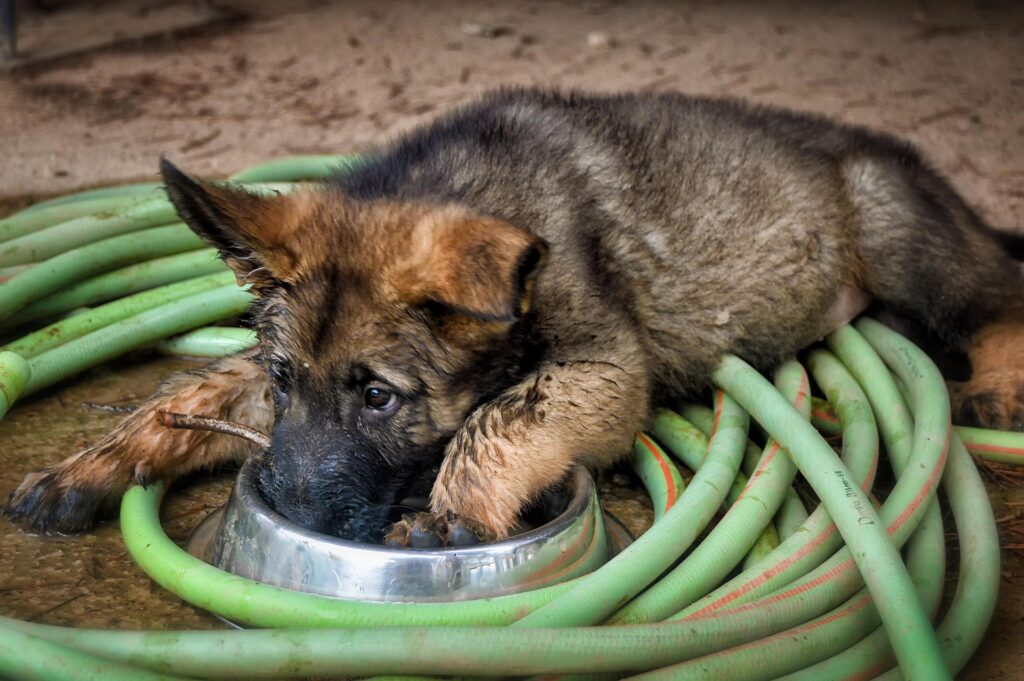Are you ready to switch to Home-Cooked Meals for German Shepherds? Whether you are a longtime dog owner or just starting, providing your puppy with healthy meals made with your own two hands is a superb way to show you care. From knowing what ingredients to include in a balanced meal plan to preparing dishes, I will guide you through creating recipes that keep your puppy tail wagging!
Your German Shepherd pup has specific dietary requirements, so you must know what they need. This species requires detailed vitamins and minerals meals need to be low in fat and rich in protein, vitamins, minerals, and other trace elements. We will go over this detail in short.
By the end of this article, you shall be confident about creating nutritious and delicious home-cooked meals for your German Shepherd pup. You can calculate how much food your puppy needs its diet provides them with everything they require for optimal health. Allow getting started!
Introduction to German Shepherd Puppy Nutrition
If you are the super owner of a German Shepherd pup, you know that the best way to keep them healthy and happy is through proper nutrition. A balanced diet full of essential vitamins and minerals is compulsory for their growth and maturation, and cooking home-cooked meals for your pup is one way to obtain all the nutrients they need.
But how do you get started? What recipes are best for your German Shepherd puppy? And what ingredients should you look for when shopping for puppy food? In this guide, we will answer all these questions and provide step-by-step instructions on how to make mouthwatering, nutritious homemade meals for your pup.
We will also provide tips on finding the right ingredients to components your pup is getting all its necessary nutrients and vitamins while avoiding harmful additives or innards.

Home-Cooked Meal Recipe Basics
If you are looking for the finest way to feed your German Shepherds with a nutritious, balanced diet, look no further than home-cooked meals. Home cooking allows you to tailor each meal to suit each shepherd pup’s specific age and activity level to obtain the nutrients it needs.
But where do you start? Here are some basic tips that will help you:
- Know the nutritional requirements: German Shepherds require a diet with plenty of protein, essential fatty acids, and minerals. Work with your veterinarian on a plan that best fits your needs.
- Balance and variety: Desire for a balance between carbohydrates, fats, and proteins in each meal, as well as providing variety whenever possible. Consider adding vegetables for extra vitamins and minerals, but choose vegetables suitable for pups.
- Keep it simple: Stick to easy-to-digest ingredients like lean meats or fish and whole grains like brown rice or quinoa when preparing meals. Avoid spices and condiments as they do not have any nutritional value and can be harmful if overused.
Following these simple procedures, you will have the full details of nutrient-packed meals perfectly tailored to your German puppy’s needs!
The best living place for a German Shepherd Puppy
Some points are more rewarding than welcoming a new German Shepherd puppy into your home. Knowing the right environment to keep your furry friend happy and healthy is food. To ensure your pup has the best nutrition, cooking up home-cooked meals especially tailored to German Shepherds is the way to go!
Home-Cooked Diet 101
Feeding your pup a nutritious, balanced diet can be tricky, but with research, you’ll know all there is to know about optimum nutrition for German Shepherds. This diet should include lean proteins like chicken or salmon, complex carbohydrates like rice or oats, fresh fruits and vegetables for vitamins and minerals, and healthy fats like olive oil.
Avoid these ingredients
When you cook for puppies it is essential to be conscious of what ingredients aren’t suitable for their health. Onions can be poisonous for dogs, and foods high in fat and sugar can lead to obesity. Grapes, raisins, and apples also have toxins that can cause serious health complications, so make sure you’re avoiding these ingredients when cooking for your dog!
By following this guideline tip you can start creating nutritious meals with the correct method that caters to a German Shepherd’s needs. With homemade meals like these, you can rest assured understanding that your pup will remain safe and healthy while getting all the nutrients they need to grow big and strong!

Ingredients to Avoid When Making Home-Cooked Meals for German Shepherds
Now that you have the basics of making a home-cooked meal for your German Shepherd pups. Allow talk about some ingredients to avoid.
Too much fat
Making sure your dog has enough fat in its diet is essential, but do not go overboard. Too much fat can cause an upset stomach and other gastrointestinal issues.
Bones or bone meal
While bones are a necessary part of a nutrient-dense diet for German Shepherds, it is best to avoid bones and bone meals in homemade recipes. Bones can crack when cooked, and splintered bone can efficiently become a choking hazard or create injuries if swallowed.
Dairy products
Dairy products like milk, cheese, and yogurt are ideal when making home-cooked meals for German Shepherds. These products have caused digestive issues in some dogs because they do not have enough of the enzyme lactase to break down dairy properly. Stick to non-dairy sources of calcium rather than leafy greens and tofu.
Alliums
Alliums like garlic, onions, and chives can irritate the stomach or menace severe anemia if consumed in high doses. That is why it is best to leave these veggies out of homemade dog food recipes altogether.
Sample German Shepherd Meals
If you have decided to take the plunge and start making home-cooked meals for your German shepherd, you need some recipes. We have got you covered with a few sample recipes to keep your pup healthy and energized.
Chicken-Vegetable Mash
It is a fantastic meal for your pup and is best easy to make. Here, I tell you what you will need:
- 1 cup of cooked vegetables (carrots, peas, beans, etc.)
- one cup of chicken, shredded and boiled
- ½ cup of cooked grains (rice, quinoa, oats)
- one tablespoon of finely chopped parsley (for flavor)
- Two tablespoons of avocado oil or olive oil
All ingredients combine in a bowl and are well mixed. Let the mixture cool before serving so it is not too hot. This recipe is great because it provides your pup with plenty of protein from the chicken as nicely as essential vitamins and minerals from the vegetables.
Fish Pie with Sweet Potato Crust
Here is what you will need:
- 1 cup of diced white fish (cod, haddock, etc.)
- ½ cup of canned pumpkin puree
- 2 cups of mashed sweet potatoes
- ½ teaspoon Italian seasoning
- ¼ cup of minced carrots
- ¼ cup of minced celery
Preheat oven to 350 degrees Fahrenheit. Prepare sweet potato mash according to instructions on the packaging or recipe instructions if using homemade mash. In a separate diced fish, pumpkin puree, and carrots.
Supplements and Vitamins for German Shepherds
Of course, cooking meals for your German shepherd is not all about proteins and carbohydrates. You will also need to give them the right balance of vitamins and supplements to keep them healthy and strong.

Here are some essential vitamins and minerals you should consider adding to your German Shepherd diet:
Vitamin C
This vitamin helps with tissue repair in the body, as well as helping keep the skin and coat radiant. Citrus fruits like oranges have a high amount of vitamin C, as well as organic chicken livers and egg yolks.
Vitamin B
This group of vitamins helps with metabolic processes and energy production for dogs. The best sources of Vitamin B include dairy products, sunflower seeds, and wild-caught fish like salmon.
Vitamin A
Vitamin A is necessary for maintaining a healthy immune system, vision, and muscle development in dogs. Foods rich in Vitamin A include liver, sweet potatoes, carrots, kale, and spinach.
Calcium
Calcium is essential for healthy bones in puppies and larger breeds like German Shepherds and be found in things like raw goat’s milk or dried seaweed flakes. Too much calcium can cause problems down the line.
Best Practices for Feeding a German Shepherd Puppy
It may come as a surprise, but following the privileged steps when feeding your German Shepherd puppy is pivotal. Here are some good practices you should test:
Schedule regular home-cooked meals for German Shepherds
Establishing a daily meal schedule helps keep your pup’s energy levels consistent throughout and is essential for helping him regulate his desires. It makes home-cooked meals with consistent portion sizes the perfect way to provide your German Shepherd puppy with the method.
Balance is key
Your pup’s nutrition needs to be balanced, so make sure his meals contain healthy fats, vitamins, and minerals to help him grow and mature properly. A home-cooked diet for German Shepherds should have a ratio of approximately 75% muscle meats and eggs, 15% vegetable matter, 5% grains or pasta, and 5% dairy products. You can also add supplements like flaxseed and fish oil for extra nutrients.
Be aware of Allergy
Most pups are allergic to ingredients like wheat and corn, so pay attention to reactions after eating home-cooked meals. If you notice signs like frequent scratching or diarrhea after feeding your pup specific ingredients, avoid feeding that in the future. By accomplishing you can help ensure that your German Shepherd puppy stays healthy and happy!
Conclusion
Feeding your German shepherd pup a home-cooked meal is not only an easy way to give them the best nutrition, but it can also be an enjoyable task. All you need is a few ingredients, some cooking supplies, and the perfect knowledge of how to prepare meals safely and correctly.
By following this guide, you will easily prepare delicious meals for your pup and provide them with the best nutrition. There is no one size of fits diet for German Shepherds, so it’s important to tailor their food to their specific needs and preferences. With minimum practice and patience, you’ll soon become an expert in cooking the perfect pup meal.
